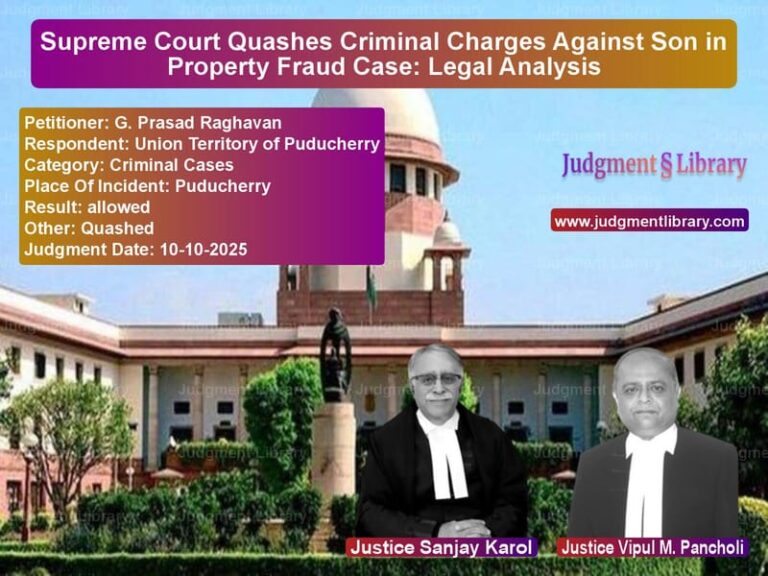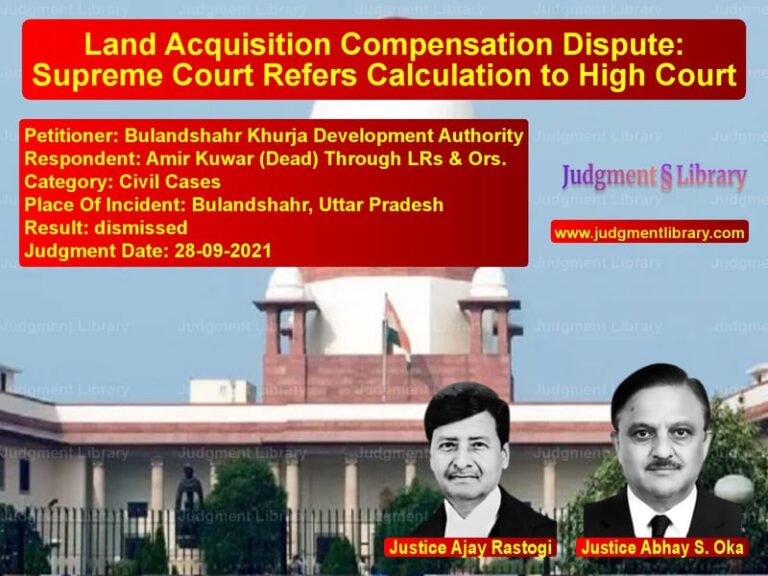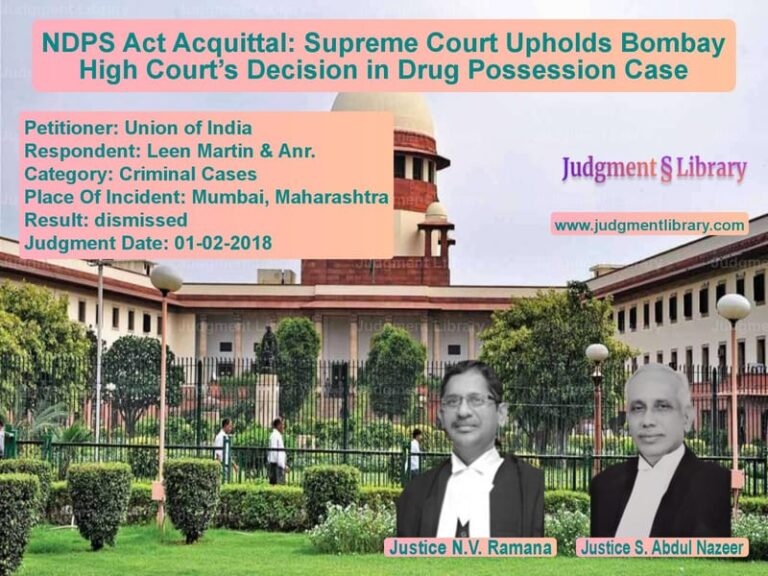Validity of Kerala Motor Vehicle Rules: Supreme Court Upholds Vehicle Replacement Regulations
The Supreme Court, in Regional Transport Authority & Anr. vs. Shaju & Others, examined whether a state government could frame rules restricting the replacement of transport vehicles with older models under Section 83 of the Motor Vehicles Act, 1988. The ruling upheld the legality of Kerala’s Rule 174(2)(c), ensuring that public transport safety and quality remain intact.
Background of the Case
The dispute arose when the respondent, Shaju, who held a stage carriage permit, applied to replace his existing 2016-model vehicle with a 2006-model vehicle under Section 83 of the Motor Vehicles Act, 1988. The Regional Transport Authority (RTA) rejected the application, citing Rule 174(2)(c) of the Kerala Motor Vehicle Rules, 1989, which prohibits replacing a vehicle with an older model.
The respondent challenged this decision in the Kerala High Court, which ruled in his favor, declaring Rule 174(2)(c) inconsistent with the Act. The RTA appealed to the Supreme Court, arguing that the rule was valid and necessary for public transport regulation.
Arguments by the Parties
Petitioner’s Arguments (Regional Transport Authority & Anr.)
- Rule 174(2)(c) aims to ensure public safety by preventing older vehicles from replacing newer ones.
- The rule aligns with the purpose of Section 83, which allows vehicle replacement with another of the ‘same nature.’
- The High Court erred in ruling that the rule exceeded the scope of the Act.
- The absence of a specific challenge to Rule 174(2)(c) meant the High Court should not have invalidated it.
Respondent’s Arguments (Shaju & Others)
- The state government lacked legislative competence to impose restrictions beyond those set by the central government under Sections 56 and 59 of the Motor Vehicles Act.
- The rule is ultra vires since it contradicts the principle that a transport vehicle should only be assessed based on roadworthiness.
- Other states do not impose similar restrictions, making Kerala’s rule unfair and arbitrary.
Supreme Court’s Key Observations
1. Rule 174(2)(c) Does Not Contradict Section 83
The Supreme Court rejected the High Court’s interpretation, clarifying that Section 83 is an enabling provision that allows vehicle replacement subject to compliance with applicable regulations:
“The phrase ‘of the same nature’ must be interpreted contextually to ensure public transport safety and efficiency.”
2. State Government’s Authority to Regulate Transport Vehicles
The Court upheld Kerala’s right to regulate transport vehicle replacement, distinguishing it from the central government’s authority over general vehicle fitness:
“Rule 174(2)(c) does not interfere with the central government’s power to determine vehicle fitness but ensures that transport vehicles in operation meet evolving safety standards.”
3. Public Safety and Policy Considerations
The Court emphasized the need for regulatory scrutiny to prevent road accidents:
“If older vehicles were freely allowed to replace newer ones, it would defeat the purpose of ensuring safe and reliable public transport.”
4. Rule 174(2)(c) Is Neither Arbitrary Nor Ultra Vires
The Court held that the rule was within Kerala’s legislative competence and did not impose an unreasonable restriction:
“The rule merely ensures that the replacement vehicle is in line with safety and operational requirements.”
Final Judgment
The Supreme Court ruled as follows:
- The Kerala High Court’s decision was overturned.
- Rule 174(2)(c) was upheld as a valid and enforceable regulation.
- The RTA’s authority to reject vehicle replacements with older models was reaffirmed.
Impact of the Judgment
This ruling has significant implications for transport law and vehicle regulations:
- Strengthens public safety measures: Ensures that older vehicles are not arbitrarily introduced into the public transport system.
- Clarifies state regulatory powers: Affirms that states can regulate transport permits within their jurisdiction.
- Upholds rule-based governance: Prevents legal uncertainty regarding the validity of state transport rules.
- Prevents policy inconsistencies: Ensures a consistent approach to vehicle replacement regulations.
The Supreme Court’s ruling provides clarity on the interpretation of transport laws and sets a precedent for future regulatory challenges.
Petitioner Name: Regional Transport Authority & Anr..Respondent Name: Shaju & Others.Judgment By: Justice K.M. Joseph, Justice Pamidighantam Sri Narasimha.Place Of Incident: Kerala.Judgment Date: 17-02-2022.
Don’t miss out on the full details! Download the complete judgment in PDF format below and gain valuable insights instantly!
Download Judgment: regional-transport-a-vs-shaju-&-others-supreme-court-of-india-judgment-dated-17-02-2022.pdf
Directly Download Judgment: Directly download this Judgment
See all petitions in Public Sector Employees
See all petitions in Recruitment Policies
See all petitions in Judgment by K.M. Joseph
See all petitions in Judgment by P.S. Narasimha
See all petitions in allowed
See all petitions in Quashed
See all petitions in supreme court of India judgments February 2022
See all petitions in 2022 judgments
See all posts in Service Matters Category
See all allowed petitions in Service Matters Category
See all Dismissed petitions in Service Matters Category
See all partially allowed petitions in Service Matters Category







